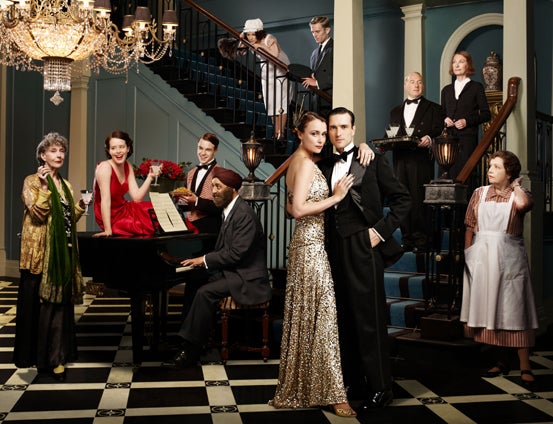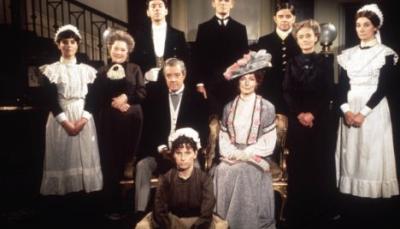The Great Upstairs Downstairs Series 1 Rewatch: “The Ladybird”

Click through for a rewatch of “The Ladybird” and come chat about it with me in the comments.
I’m really not sure what we’re supposed to make of the fact that all the episode titles in this series are birds. What does it mean? What do the birds symbolize? Or is it totally arbitrary? I get that the reference in the title is to a song sung multiple times during the episode, I’m just unclear what it means in a more big picture sense. If it means anything.
Domestic Adventures at Eaton Place. Life in the Holland household appears to be settling into something like routine, both upstairs and down. Rose yells at the staff for their lateness in serving food, Cook complains about the boring nature of Agnes’ breakfast choices and Lady Maud’s monkey apparently has a fondness for maraschino cherries. And that’s before we get to Lady Persie and her curtsying (etiquette? cotillion?) classes and a downstairs dispute about who has to clean the car after Lady Agnes gets sick all over it. It’s all ever so domestic and entertaining – and to be honest, I much prefer the show like this, when it’s dealing with the intricacies of life in the household – how it runs and how they all interact with one another – than with the big, sweeping storylines about fascism and Nazis and political marches that we’re going to get in a minute.
This show really does do little things so well – establishing realistic relationships between most of the downstairs staff, making the dynamics between Agnes, Hallam and his mother believably complicated, and hinting that all these people had real lives before they came to Eaton Place (Agnes’ miscarriage, Maud’s daughter who died, whatever happened to Hallam at Waterloo). While no huge plot developments are advanced by the Hollands at breakfast or Persie’s apparently quite excellent curtsy, I think it’s these sort of slice of life moments that people who love period dramas really enjoy. (It’s almost irritating that we have to drift away from this to politically-focused storylines – I’d be perfectly happy watching Eaton Place domestic life develop for the next hour.)
Sybil and Branson 2.0. I know I promised to ease up on the Downton Abbey comparisons here, because that’s not really fair to Upstairs Downstairs and it deserves to be judged on its own merits blah blah blah. But, since I’m faced with yet another Younger Aristocrat Sibling Gets Romantically Involved with the Driver subplot, I simply cannot help myself.
After the first episode’s weird “I’m not really a lady, I don’t know how to handle riding in a car with a driver” semi-flirting, we discover that, yes, garages are apparently the hot spot for young love these days, though at least Harry the Driver does do other things besides work on eternally broken vehicles. Persie wanders into the garage wearing something that I think is supposed to be a dress but looks more like a very fancy nightgown to retrieve some cigarettes that she left in the car, even though everyone else in the house smokes and it’s not like she couldn’t find one, oh, anywhere else in the building. Harry the Driver sees through this blatant ploy and tells her that she ought to go to bed. Persie complains that she couldn’t because there was no one around to undress her and we’re all shocked by her totally not at all appropriate behavior. (Point one to Sybil for propriety at any rate.)
Somehow this barely hidden come-on does not actually derail their conversation, and the two of them end up talking about Sir Oswald, a big deal Fascist organizer that Persie met at a party that night. Suddenly Harry the Driver appears to think that Persie is amazing thanks to this new six degrees of Kevin Bacon connection to his pet political cause and he stares longingly after her as she departs. This is not going to end well.
Rachel = Character or Plot Point? Eaton Place gets a new maid named Rachel, who is so obviously MORE THAN SHE APPEARS what with her smart suit, not knowing where the servants’ entrance is and ease at shaking hands with Hallam. But though she is clearly full of secrets it turns out she’s actually super nice, singing Ivy lullabies and convincing Mr. Amanjit to make friends with the rest of the staff. It also turns out that Rachel is both an asthmatic and a Jew (these will be important later), who was forced to flee Germany with her daughter after her husband was convicted of political crimes. Of course, she’s lied to the Holland household about both her marriage and her child – telling them that her husband is dead and not mentioning a kid at all.
All of this is basically a giant “you will sympathize with Rachel” maneuver – which completely works because, well, we’re not made of stone. She’s kind and good and has had a really rough lot in life and it’s hard to dislike her. Even if her main job does appear to be dispensing sage advice and being a symbol as much as she is a person.
Line of My Life. “I did tell Agnes to vomit in her handbag, but she refused because it was suede-lined.” Oh, Lady Maud how are you so awesome.
Shut Up, Persie. Lady Maud encourages Persie to familiarize herself with the important issues of the day, so that she can keep up with the educated gentlemen in their social circle. Persie apparently translate this as, go right ahead and become a creepy Fascist party supporter. Persie stalks back to the garage in search of Harry the Driver and finds out he’s planning to attend a speaking engagement by their new favorite political instigator, Sir Oswald. She then forces him to ostensibly drive her to the opera, but basically stalks him to the rally instead, wearing a completely inappropriate (but quite stunning) slinky fire-engine read dress. If the slow-mo that went into effect the instant they saw one another is any indication, this is really not going to end well.
It’s unclear what exactly Persie’s trying to do here – how much of her interest in fascism is rebellion against the life she’s currently leading with its debutante balls and curtsy lessons, and how much is because she’s just crushing on the Holland’s driver. There’s an awkward scene where she tells Harry the Driver that she “hates the rich” and is glad that Sir Oswald plans to break down class barriers. Harry informs Persie that, surprise, she is, in fact one of the rich herself, but she claims that she’s actually poor because everything she has has been given to her by someone else and therefore she has no real freedom. This argument is nonsensical and completely unsympathetic (it’s like the definition of first world problems), but it is fantastic that they are at least trying to give Persie something that resembles a point of view, which I think some other shows (coughDowntoncough) could in some ways take a lesson from.
And Shut Up, Harry the Driver. After a time-jump montage, we learn that Harry the Driver and Lady Persie have something of a relationship situation going on, where they cuddle together and listen to Fascist Party speeches in his room. So romantic! Because Harry the Driver is a winner, he then shows up to tea in his full-on British Union of Fascists uniform and tells everyone on Team Downstairs that he’s marching in a pro-fascism political parade the next day. Rachel, being Jewish, understandably freaks out, and refuses to eat at the same table with him. Both Rose and Mr. Pritchard tell Harry the Driver that he needs to go put on something more appropriate and a very interesting conversation about being able to dress as you like and express your personal views through attire takes place and, eventually, everyone but Rachel gives in and decides that he’s just too stubborn to bother to fight with about it. Rachel runs off and has (another) asthma attack.
It’s an interesting scene in the sense that Harry the Driver has a point about personal choice and freedom of expression and generally I support that, but he’s so vile about it – and so callous toward Rachel’s obvious distress – that it’s hard to think of him as anything but horrible, and that’s before you factor in the “cause” he’s supporting.
Another Ending Crammed with Drama. I’m sensing a theme with these episodes. The last ten minutes of this episode – much like “The Fledgling” – are so are just crammed with activity that it’s a bit overwhelming. The Fascist political protest/rally takes place – Persie and Harry the Driver go to march and cheer, while Rachel and Mr. Amanjit go to protest the protest. The crowd becomes unruly and basically a riot breaks out, complete with shoving, fighting and people nearly getting trampled.
In the aftermath, Rachel discovers that Persie’s a fascist supporter, has another asthma attack and dies on her bedroom floor, presumably because she can’t deal with the thought (terror?) of working for a family where one of the major players supports fascism. Yup, that happened.
Persie has a mini-breakdown and takes Harry the Driver’s car to escape the mess of the really, and in retaliation Harry reports the car as stolen. This is actually not a completely hateful maneuver – it’s so the police will find Persie and pick her up, since she’s a danger to everyone in her emotional state and what with not knowing how to drive. Hallam angrily confronts Harry the Driver and everyone rants at Persie, who has now been outed to the family as a Fascist supporter. Also, Rachel’s funeral happens and her daughter is left with no one to take care of her. She basically gets adopted by Team Downstairs and Hallam says okay because the little girl bribes him with marbles he discovers a conscience from somewhere, I guess. It’s really quite a lot to pack in to the very end of an episode and almost too much at once to process. How are we supposed to feel about any of these people? Other than poor Rachel and her poor daughter, who is all alone.
Also Agnes is Pregnant. I mention this only as I expect it will be a plot point in the next episode. Nothing at all really happens for either Lord or Lady Holland in this episode – Agnes faints, throws up, shops for prams, models clothes, winds wool and that’s….kind of it for her in this one. Hallam at least gets a pretty awesome moment where he declares that Rachel’s now-orphaned daughter will stay at Eaton Place and puts the verbal smackdown on Agnes for offering to send a Jewish little girl back to Germany, of all places, but other than that he’s not got much to do either.
But, all told, this is a pretty entertaining hour of television, and enough happened for me to be curious about what’s going to go down in the finale. Agnes obviously doesn’t like becoming a surrogate family for a stranger’s child and there’s surely more fallout from the Persie and Harry situation on the horizon. What did you think? Did this ep work better for you?


